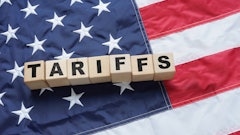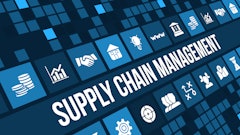Execs cite supply risks as major concern, but half in FM Global survey say threats associated with globalization and outsourcing are low priority
Johnston, RI — September 21, 2005 — Supply chain risks pose the top threat to companies' revenue, but many companies view the risks associated with globalization and outsourcing as a low priority or concern for their organizations, potentially leaving their supply chains vulnerable, according to a new FM Global study of financial executives at the world's top companies.
The study, "Managing Business Risk in 2006 and Beyond," contains the perspectives of more than 600 financial executives, including chief financial officers CFOs and treasurers, the majority of whom work for companies with at least $1 billion or more in annual revenue. FM Global, a commercial property insurer, commissioned Harris Interactive to conduct the study.
While the survey results suggest that supply chain risks are the leading threat to companies' revenue, half of the respondents to the survey said that they view the risks associated with globalization and outsourcing as a low priority or concern for their organizations.
The study also found:
"With globalization and outsourcing stretching the supply chain and introducing new and never-before anticipated business challenges, the findings suggest many companies may want to ensure they are doing all they can to deter a disruption of any kind," said Bosman. "At the same time, it's encouraging to see so many companies focusing on risk control rather than simply buying insurance to cover losses. The most progressive financial executives do not wait for a disruption to their businesses to demonstrate the value of investing in risk quality."
Bosman added: "Companies that manage their risks properly and communicate the effectiveness of such efforts to their many stakeholders will find they not only gain a competitive advantage, but also boost financial performance, enhance shareholder confidence and help protect the value their businesses create."
The survey results are available online at www.protectingvalue.com.
Additional Articles of Interest
— Supply chain executives are discovering new ways to apply technology and innovative processes to the challenge of managing uncertainty. Read more in "Rethinking Risk," cover story in the August/September 2005 issue of Supply & Demand Chain Executive.
— Is it possible to preemptively address the business risks associated with product quality? One industry executive thinks so. Read more in "The Quality Risk," the Executive Memo column in the August/September 2005 issue of Supply & Demand Chain Executive.
— For a perspective on the persistence of paper in the supply chain, read "Paper: Still the Net Best Thing," the Net Best Thing column in the December 2002/January 2003 issue of iSource Business (nowSupply & Demand Chain Executive).
Johnston, RI — September 21, 2005 — Supply chain risks pose the top threat to companies' revenue, but many companies view the risks associated with globalization and outsourcing as a low priority or concern for their organizations, potentially leaving their supply chains vulnerable, according to a new FM Global study of financial executives at the world's top companies.
The study, "Managing Business Risk in 2006 and Beyond," contains the perspectives of more than 600 financial executives, including chief financial officers CFOs and treasurers, the majority of whom work for companies with at least $1 billion or more in annual revenue. FM Global, a commercial property insurer, commissioned Harris Interactive to conduct the study.
While the survey results suggest that supply chain risks are the leading threat to companies' revenue, half of the respondents to the survey said that they view the risks associated with globalization and outsourcing as a low priority or concern for their organizations.
The study also found:
- The most prevailing emerging risk cited by companies worldwide is "governmental or regulatory" — outpacing even "competition," which ranked second.
- North America-based companies are roughly twice as likely as their overseas counterparts to cite "insufficient time," "inadequate personnel" and "insufficient budgets" as the biggest obstacles to addressing top risks.
- On average, respondents indicate the majority of their risk management budgets are allocated to risk control (loss prevention) rather than risk transfer (buying insurance).
- Recent corporate governance reforms have increased companies' focus on risk management either moderately to highly at 88 percent of North America-based companies surveyed, as well as at 78 percent of companies based overseas.
"With globalization and outsourcing stretching the supply chain and introducing new and never-before anticipated business challenges, the findings suggest many companies may want to ensure they are doing all they can to deter a disruption of any kind," said Bosman. "At the same time, it's encouraging to see so many companies focusing on risk control rather than simply buying insurance to cover losses. The most progressive financial executives do not wait for a disruption to their businesses to demonstrate the value of investing in risk quality."
Bosman added: "Companies that manage their risks properly and communicate the effectiveness of such efforts to their many stakeholders will find they not only gain a competitive advantage, but also boost financial performance, enhance shareholder confidence and help protect the value their businesses create."
The survey results are available online at www.protectingvalue.com.
Additional Articles of Interest
— Supply chain executives are discovering new ways to apply technology and innovative processes to the challenge of managing uncertainty. Read more in "Rethinking Risk," cover story in the August/September 2005 issue of Supply & Demand Chain Executive.
— Is it possible to preemptively address the business risks associated with product quality? One industry executive thinks so. Read more in "The Quality Risk," the Executive Memo column in the August/September 2005 issue of Supply & Demand Chain Executive.
— For a perspective on the persistence of paper in the supply chain, read "Paper: Still the Net Best Thing," the Net Best Thing column in the December 2002/January 2003 issue of iSource Business (nowSupply & Demand Chain Executive).















![Pros To Know 2026 [color]](https://img.sdcexec.com/mindful/acbm/workspaces/default/uploads/2025/08/prostoknow-2026-color.mduFvhpgMk.png?ar=16%3A9&auto=format%2Ccompress&bg=fff&fill-color=fff&fit=fill&h=135&q=70&w=240)



